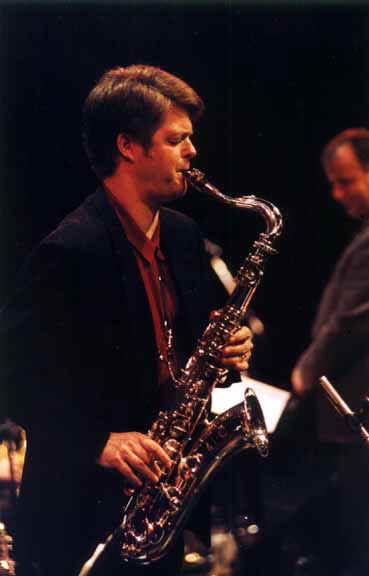Michael Brecker RIP
I've been pretty bummed out about hearing about his passing yesterday. I had to check it out several ways on the net just to make sure that it wasn't another malicious rumor. CBC reported it this morning, so that's official enough for me. But I still went to his website to see the absolute proof.
I've visited a terminal leukemia patient in the hospital. It's one hell of a way to go. I wouldn't wish it on anybody.
He'd been sick for two and a half years, and I hadn't heard anything for a while. The previous news I'd heard was that the experimental therapy had gone well and he was home practising. That was quite a few months ago, and just last week I thought about contacting Terry Deane for an update.
About a year ago I spent some time giving thought as to what constitutes a contemporary saxophone sound. There are so many styles and so many great players out there that I admire. Given my tastes that run to the avante garde, the field is even more wide open.
But for what I consider to be the mainstream, nobody embodied the contemporary tenor sax better than Mike Brecker. That he was a technichal master of the instrument is undeniable. He may well be the most influential saxophone player since Trane.
In the various student music festivals I've been involved with, I saw the emerging young lions announcing their arrival by playing (or trying to play) "that Brecker shit", not Bird, not Trane. It seemed to be to be the new benchmark.
I first heard him in the mid-seventies with The Brecker Brothers. As he started on his solo career ten years later, I bought his records. I didn't snap up everything that he released. At times the density and complexity of what he did overwhelmed me. Dexter was more my style for a number of years.
But one could not ignore the breadth of his work. Sometimes I preferred his work as a sideman, or an album where he didn't write all of the tunes. The McCoy Tyner cd Infinity remains one of my faves.
We added a couple of his tunes to our set lists, Midnight Voyage and El Nino, the former truly deserving to be considered a standard. I'd never play my Brecker shit with these tunes because frankly, I don't have any.
I bought a book of his transcriptions about a dozen years ago. I don't have a lot of books of transcriptions and the only one I've ever played cover to cover (with a nice slow metronome) was the Charlie Parker Omnibook. I had one of Dexter's (I could get the notes but never really get the feel) and one of Trane's (simply an exercise in humility). Brecker's book fell into the latter category. I pull those books out maybe once a year and they act as a benchmark. I generally find that I can play a bit more of the transcriptions, but the vast majority is beyond my grasp. That's really OK with me. I don't set out to try to imitate these guys, just to learn a bit more each time. I opened it up for about half an hour last night.
The thing about the Brecker transcription book is that it seems to be a vehicle for the enviable abilities of Carl Coan, the transcriber, who has gone to great lengths to notate what Brecker did in some of his solos. I really don't think that Mike really was planning on playing four groups of sixteeenth notes with a 13:2 ratio, or pickup notes of tenthtuplets or whatever. This is somebody elses scarily detailed interpretation of what he heard Brecker do. It makes it easy for an uninitiated player to miss the essence of Brecker's abilities, his command of the time, deep understanding of form and chord structure and the ability to impose shapes of notes, his own idiosyncratic lines, over the changes, regardless of what the changes were, yet they always sounded right.
And how many Guardala mouthpieces were sold to guys trying to emulate that unique sound? This of course fits into the category of "What reeds should I use to sound like Charlie Parker?"
I have often been of the opinion that Brecker's technical brilliance overpowered the emotional content of his playing. However in recent years, I felt that he was working on incorporating that more into his music. His last show here, at Cap College, was thrilling. That disease would probably have already been eating at his bone marrow.
Reading that he wrapped up his final recording project just two weeks ago, it will be most interesting to hear what he sounded like, with mortality clearly staring him in the eye.
Sunday, January 14, 2007
Subscribe to:
Post Comments (Atom)

No comments:
Post a Comment